The following column is an opinion piece and reflects the views of only the author and not those of AllOnGeorgia.
Why are local governments so quick to limit free speech?
This seems like an obvious, rhetorical question that government simply does not want to hear from the public because elected officials are viewed as celebrities as opposed to public servants, but on the heels of what happened last week in Peachtree City, the question really has me pondering how long the suppression is going to go on before it actually ends up in the courts.
The State of Georgia, while giving the impression of an ethics-centric state, has what I would call lukewarm sunshine laws. The laws, like any, have loopholes and leave room for interpretation, but the meat is in the enforcement and Georgia is lacking in enforcement. The Open Records Act and Open Meetings Act are both under the purview of the Georgia Attorney General’s Office and while the office has an open government division, the implementation is geared more toward ‘mediation’ than it is ‘enforcement.’ Local government officials can plead the ignorance card, the ‘I’m so busy!’ card, or the ‘That activist is a nut job!’ card and see leniency when it comes to retraining, sanctions, and fines. But, even through all of that, strongly worded letters, embarrassment in the media, and cited code sections get us much further in the peach state than in some other states.
Sunshine laws aren’t what I’m referring to when I mention the limits on free speech, but it’s important to acknowledge that the one Constitutionally-created state agency that can legally hold local governments accountable usually doesn’t… and that sets a precedent for everything else that trickles down from there.
The trickle down I’m referring to relates to the hurdles citizens, business owners, and sometimes even members of the press have to go through just to address local government officials.
There is no state requirement that mandates that local governments open the floor for public comment during workshops and/or governmental meetings, though some states do. Without a standard or a baseline at the state level, you end up with different rules for every city, county, and school board to regulate how the public goes on the record in an official meeting. Time may be limited to 2, 5 or 10 minutes. Some places require that citizens sign up before the meeting starts, while others demand that citizens give several days notice. Some have disclaimers that individuals may not be addressed, school boards note on their agendas that personnel matters can not be discussed, and some local governments prohibit discussion on matters that are not already on the agenda.
This bleeds over to social media where local governments haphazardly create their own restrictive policies about what can be discussed on their official pages and notate when they will delete comments and ban users.
And that’s wrong.
No governmental entity should tell us what subject matter we can and cannot include when we seek to hold our elected officials accountable. This isn’t just my opinion, either.
The courts have repeatedly ruled in favor of the First Amendment in public forums holding that content-neutral restrictions — like time and place — are permissible, but content-based restrictions — as in actual subject matter – are not. The standard is that rules must be ‘viewpoint neutral,’ in that if one viewpoint is welcome, all viewpoints are welcome. This is illustrated in City of Madison Joint School District No. 8 v. Wisconsin Employment Relations Commission,(1976), in Wilkinson v. Bensalem Township (1993), and City of Dayton v. Esrati (1997), to name a few. There are dozens and dozens of cases, but I won’t bore you with the endless citations.
The point is that citizens cannot be disruptive or repetitive or filibuster, but once the floor is opened for public comment, the governmental entity cannot tell you what that public comment can and cannot entail.
And those rules about not mentioning specific government employees or individual elected officials? They’re garbage, too. See Leventhal v. Vista Unified School District (1997), where the court wrote: “It seems clear that the Bylaw’s prohibition on criticism of District employees is a content-based regulation. … It is equally clear that the District’s concerns and interests in proscribing public commentary cannot outweigh the public’s fundamental right to engage in robust public discourse on school issues.” It was upheld again in Bach v. School Board of the City of Virginia Beach, 2001 and in 2016, the Virginia Attorney General issued an opinion halting government entities from prohibiting discussion on government employees.
The courts have also held that anything that takes place on official social media accounts is official public record and must be maintained. See Davison v. Loudoun County Board of Supervisors (2017) and Packingham v. North Carolina. Georgia’s Open Records Act also encompasses digital content and the retention of such information is detailed on the state archives policy.
You don’t have to be a lawyer to understand these things.
Many of you know that I live and work in rural southeast Georgia and while the issues are rampant down here, the limits on the First Amendment extend well beyond the boundaries of my region.
Just look at a few of these policies, which are publicly displayed and in conflict with legal precedent:

Bulloch Co. Board of Education limits content
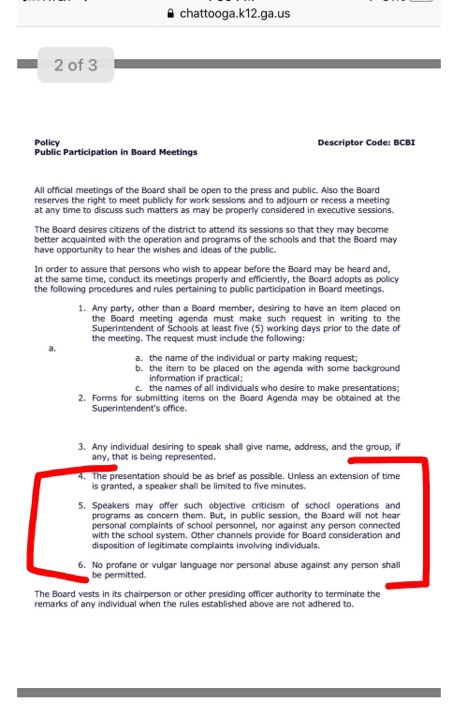
Chattooga County Board of Education is bold enough to include that one must be ‘objective’ in commentary
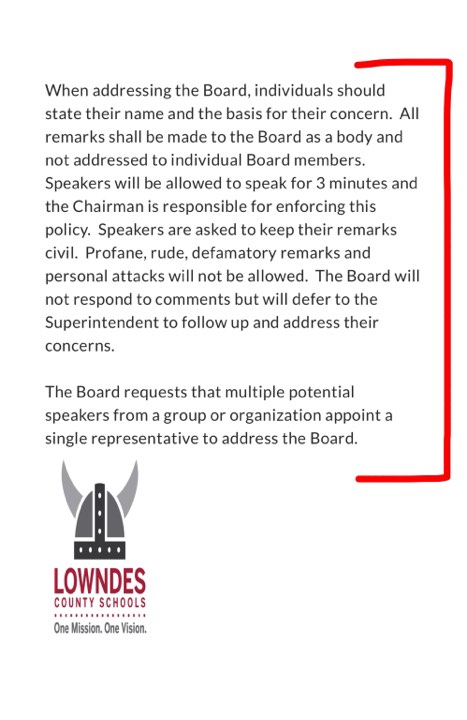
Lowndes County Board of Education public comment policy.
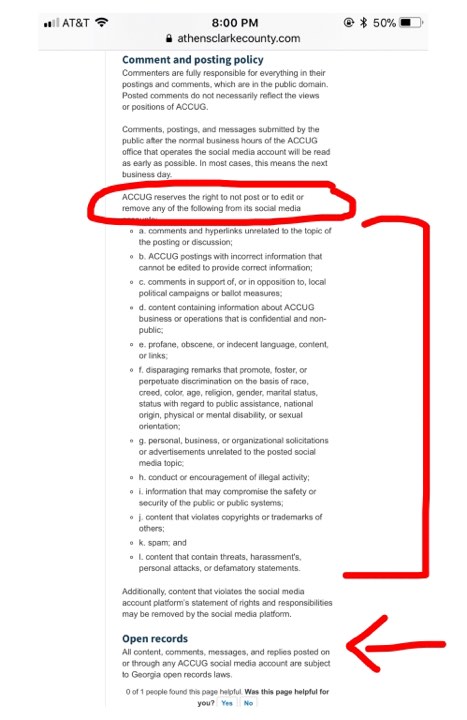
Athens-Clarke County’s social media policy is very strict and, while mentioning they delete comments, they also mention it’s subject to the open records act.
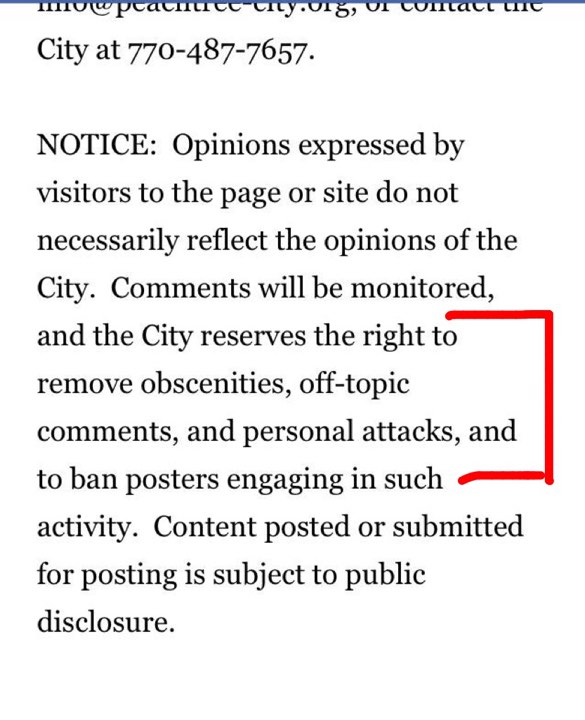
Peachtree City social media policy
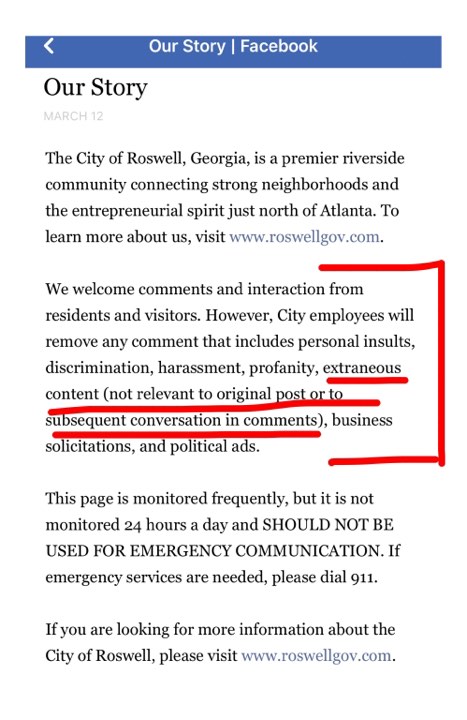
City of Roswell social media policy.
And look at this lengthy public participation request form required in Douglas County. Or Vidalia City Schools which says “The board Chair will determine whether it is in the interest of the school system to allow the request.” Or Glynn County which says you can’t insult anyone in government.
So why do they do it anyway? And why aren’t local governments held accountable when they delete comments and questions off of social media, especially if the platforms are considered ‘official record’?
My guess is that this will continue until someone files a lawsuit and forces them to stop or the state legislature takes the lead and prioritizes transparency at the state and local level. It’s bad enough that local governments aren’t required by law to make time for citizens to speak up. It’s even worse that they work to limit the content in the growingly-rare instances that they ever-so-graciously allow the little people to speak out.
If you know of a local government that limits the content of public speech in meetings, I’d love to hear from you.
Jessica Szilagyi is a former Statewide Contributor for AllOnGeorgia.com.

3 Comments
Leave a Reply
Cancel reply
Leave a Reply

Chattooga Opinions
Medically Supervised Weight Loss: Inside Premier Weight Loss & Medispa

Chattooga Local News
Georgia Power Files Plan for Customer Rate Decrease with Public Service Commission

Chattooga Local Government
Carr Pushes for Permanent Halt of Medicare and Medicaid Funding for Child Sex-Change Procedures

Bulloch Public Safety
02/20/2026 Booking Report for Bulloch County

Bulloch Public Safety
01/26/2026 Booking Report for Bulloch County

Bulloch Public Safety
02/09/2026 Booking Report for Bulloch County

Bulloch Public Safety
02/16/2026 Booking Report for Bulloch County

Bulloch Public Safety
02/02/2026 Booking Report for Bulloch County

Bulloch Public Safety
01/30/2026 Booking Report for Bulloch County






Dennis Gailey
April 23, 2019 at 10:26 pm
You’re right. It’s just about everywhere.
George Wilson
May 11, 2019 at 5:01 pm
Perhaps for the same reason your publication want print my comments…
Senator good relationships and political capital are built over time …
Any day we can expect our lightweight United States Senator David Perdue, to emerge from his mansion in his closed community wearing his denim jacket to denounce the rising debt level. This is after his vote on the budget busting tax cut.
Along with this consider his continued support of leaving the Guantanamo prison open at a cost of $10,000,000 per detainee (says Human Rights First) and the expensive tax cuts that benefits the top one percent and corporations. In addition, he voted to increase defense spending without the often promised investigations to end the waste and corruption in military operations and procurement that continues unabated.
Perdue has a 76 percent approval ranking from Georgia Republicans, yet has voted against the average Georgians interests. What does that tell the average voter?
His sycophantic support of President Trump has certainly not benefited Georgia’s hard hit hurricane victims. His political skills in dealing with Democrats are almost non-existent.
Perdue continues to be, as Trump puts it, “to be a person from central casting who looks like a Senator.”
The one thing I do know is his eagerness to cut entitlements as a way of reducing the national debt and government expenditures. This means cuts in Social Security and Medicare. Furthermore, the disappointment on his face and his gestures when John McCain voted to keep the Affordable Health Care Act will forever remain in my mind. He was the presiding officer at the time and I got a good look at him on C-SPAN.
Partisanship is an issue currently in Washington, and Perdue wrongly puts the blame on the Democrats. Here is a senator who failed to vote for Obama’s moderate nominee for the Supreme Court, Merrick Garland. His friend, the Majority Leader Mitch McConnell, promised to obstruct Obama at every turn.
What is the definition of a hypocrite? Perdue’s and Trump’s political ineptness are causing the following:
• Georgia farmers are going bankrupt;
• California wildfire victims are struggling to rebuild; and
• Puerto Rican families are losing access to food benefits.
Further, he stated: “This economy is growing rapidly. We’ve created five-million new jobs.” Moreover, he exclaims that unemployment is the lowest that it’s been in over 50 years. “So, we got the economy moving,” taking credit for what Obama and the Democrats started.
“We made a dent in the long-term debt by growing the economy. A significant dent,” said Perdue. Remember that statement when cuts are proposed by Republicans to human services to balance the budget. But wait until his main constituents in rural Georgia become aware that they are not benefitting from this so called success.
G C Wilson
May 11, 2019 at 5:02 pm
Senator good relationships and political capital are built over time …
Any day we can expect our lightweight United States Senator David Perdue, to emerge from his mansion in his closed community wearing his denim jacket to denounce the rising debt level. This is after his vote on the budget busting tax cut.
Along with this consider his continued support of leaving the Guantanamo prison open at a cost of $10,000,000 per detainee (says Human Rights First) and the expensive tax cuts that benefits the top one percent and corporations. In addition, he voted to increase defense spending without the often promised investigations to end the waste and corruption in military operations and procurement that continues unabated.
Perdue has a 76 percent approval ranking from Georgia Republicans, yet has voted against the average Georgians interests. What does that tell the average voter?
His sycophantic support of President Trump has certainly not benefited Georgia’s hard hit hurricane victims. His political skills in dealing with Democrats are almost non-existent.
Perdue continues to be, as Trump puts it, “to be a person from central casting who looks like a Senator.”
The one thing I do know is his eagerness to cut entitlements as a way of reducing the national debt and government expenditures. This means cuts in Social Security and Medicare. Furthermore, the disappointment on his face and his gestures when John McCain voted to keep the Affordable Health Care Act will forever remain in my mind. He was the presiding officer at the time and I got a good look at him on C-SPAN.
Partisanship is an issue currently in Washington, and Perdue wrongly puts the blame on the Democrats. Here is a senator who failed to vote for Obama’s moderate nominee for the Supreme Court, Merrick Garland. His friend, the Majority Leader Mitch McConnell, promised to obstruct Obama at every turn.
What is the definition of a hypocrite? Perdue’s and Trump’s political ineptness are causing the following:
• Georgia farmers are going bankrupt;
• California wildfire victims are struggling to rebuild; and
• Puerto Rican families are losing access to food benefits.
Further, he stated: “This economy is growing rapidly. We’ve created five-million new jobs.” Moreover, he exclaims that unemployment is the lowest that it’s been in over 50 years. “So, we got the economy moving,” taking credit for what Obama and the Democrats started.
“We made a dent in the long-term debt by growing the economy. A significant dent,” said Perdue. Remember that statement when cuts are proposed by Republicans to human services to balance the budget. But wait until his main constituents in rural Georgia become aware that they are not benefitting from this so called success.